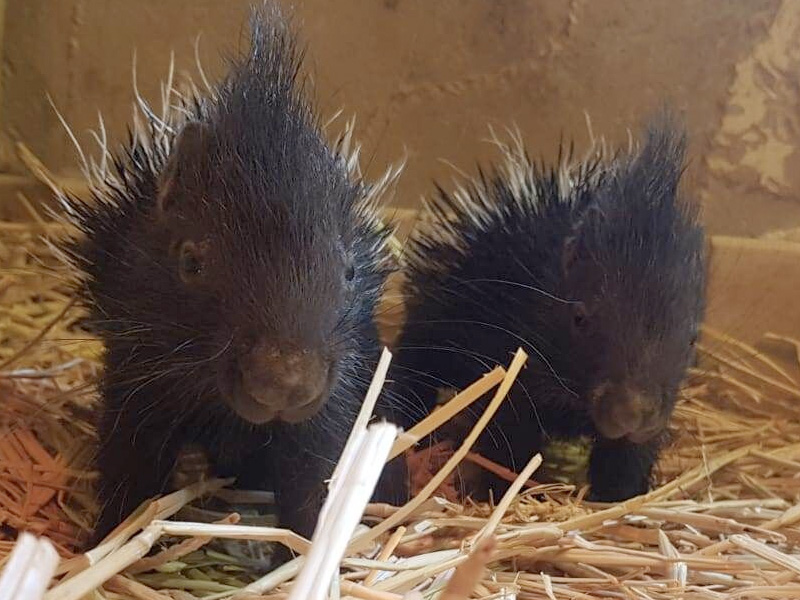Spiky arrivals: Cotswold Wildlife Park welcomes tiny Porcupette twins

The mating game is always an unknown entity in nature. Some animals bond immediately but others show absolutely no interest in a potential partner. When it comes to animal introductions at the Cotswold Wildlife Park, despite the best efforts from keepers to create the perfect environment, there are no guarantees. It’s the animal equivalent of a blind date. Thankfully, in the case of a rather prickly introduction between two Porcupines, things couldn’t have gone smoother. All expectations were exceeded when two-year-old Hannah arrived from the Czech Republic last September and was paired with the Park’s breeding male – a Cape Porcupine called Prickle. Keeper Estelle Morgan commented: “As soon as Hannah was introduced into the enclosure, they immediately began grooming each other and establishing their monogamous pair-bond. They were sleeping side by side from day one and were seen mating not long after”.
Hopeful that the new pair would one day produce their first litter, keepers were slightly surprised to discover two tiny new arrivals during their early morning checks. Estelle explains: “Hannah gave birth overnight and I found the babies running and squeaking at each other in the morning. On the first checks, both adults were asleep with the Porcupettes tucked underneath them so they weren’t discovered until I went into the enclosure to clean and feed them. I suspected Hannah might be pregnant as we had observed them mating frequently but we didn’t expect them to be born quite so soon! I even saw Prickle mating with her the night before she gave birth. We have sexed the twins and they’re both boys”.
It is only the second time in the Park’s forty-nine-year history this species has successfully bred. The babies, also known as Porcupettes, are on show in the enclosure they share with a group of inquisitive Dwarf Mongooses.
When they were just a few days old, keeper Estelle captured the pups confidently taking their first steps on camera. Below is footage, including the newborns squeaking to each other and stamping their tiny feet. Five-year-old Prickle (also the collective noun for a group of Porcupines) and first-time mother Hannah are proving to be formidable parents.
The babies are perfect miniature versions of the adults, even born with a full set of quills. After a gestation period of approximately one hundred and twelve days (the longest gestation period of any rodent), the female gives birth to offspring covered in soft, moist and flexible quills, enclosed in a thin placental sac. Immediately after birth, the quills quickly harden in the air and become prickly. They are born relatively well developed with eyes open and teeth present.
Curator of Cotswold Wildlife Park, Jamie Craig, said: “Baby Porcupines are incredibly popular with our visitors – essentially miniature replicas of their parents. We are always delighted with these additions to the animal collection and it is great to watch them exploring their exhibit with the same feisty attitude as the adults”.
As well as the Porcupettes, the Park is delighted to announce the following new arrivals:
- A Kirk’s dik-dik calf. The shy youngster has been named Noodle by her keepers. Visitors can see these delicate dwarf Antelopes in the Little Africa exhibit.
- Parma Wallaby joeys have started to venture out from their mothers’ pouches and explore their woodland home by the lake area.
- The birth of adorable Emperor Tamarin twins. The moustachioed babies are on show in their exhibit opposite Madagascar.
- The breeding Ostrich pair (the world’s largest bird species) recently produced three chicks (pictured bottom right). Visitors can see the new feathered family in the large grassy paddock as you enter the Park.
Cotswold Wildlife Park, near Burford is open daily from 10am.
Explore Gloucestershire
18 April 2019
For further information.
OTHER NEWS
